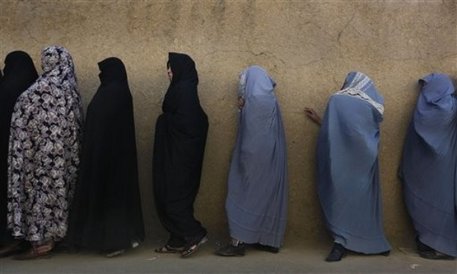
It was on this day in 2001 that the United States and Britain launched Operation Enduring Freedom in Afghanistan, which seems as proper a time as any to note an interesting contrast concerning our continuing conversation about the moderation of the Muslim world. This contrast comes from the Council on Foreign Relations transcript of Malaysian Prime Minister Najib Razak's remarks last week, where he repeated some of his prior calls for a movement of the moderates. But what stood out to me is this interesting story, which he notes in passing:
Malaysia is also a country that can play our part in terms of providing some leadership role in global affairs. For example, as part and parcel of the new engagement with the United States, we have decided that we should contribute in a positive way by being present in Afghanistan, because Malaysia has -- or Malaysia is one of the very few countries in the world that has something unique that other countries don't have: We can provide female Muslim doctors. That is much needed in Afghanistan, a society like Afghanistan.So I promised President Obama that I would do it. And on the invitation of the Afghanistan government, as this is part of our help to reconstruct Afghanistan, in two weeks' time, the doctors will be in Afghanistan.
This is obviously a laudable step for Malaysia and the women involved. It's also a positive sign in terms of paired U.S.-Malaysian security interests in Afghanistan (though of course, the medical mission is headed there at the request of the Afghan government), which will hopefully continue. Najib spoke to several writers during his time in New York, including myself, and while a longer piece will come shortly concerning his responses to several questions on security and economic policy, his remarks on this mission are worth sharing in full:
I committed to agreeing that we should have a presence in Afghanistan, and the advance party is already in Afghanistan -- the main body will be there by the middle of October, because we had to construct accommodations for them.We decided to be part of the reconstruction in Afghanistan, specifically sending a medical team, because we have one thing very few countries in the world can provide: Muslim women doctors.
In a very conservative society there, the women would rather be treated by Muslim women doctors, and Malaysia is one of the very few countries that can provide this. We'll be sending one doctor, one dentist, and five medical orderlies now and more as part of a larger contingent. And that's a very good start I think...
There's a need for us to be part of the global community in addressing these concerns, and this is the advantage of where Malaysia is positioned, being a moderate Muslim nation, to lend support to a variety of global initiatives.
This is, indeed, a good start. Yet at the same time, it's a sign of how much the Muslim world in general lags behind the rest of the world when it comes to the plight of women. Contrast the plight of Muslim women in Afghanistan - an area where some small progress was made in the past several years, and much is now at risk - with the experience of women of the same faith in Malaysia, according to Najib's answer to Brooks Entwistle of Goldman Sachs:
QUESTIONER: Thank you very much. Brooks Entwistle, Goldman Sachs, based in India, in Mumbai. We as a firm were doing for many years in Malaysia; in fact, just opened a KL office, which we're delighted about.My question today is about the role of women. You mentioned doctors from Malaysia to Afghanistan. There was a very interesting piece this week in the Herald Tribune on women leadership in Islamic finance and chairing some of the major banks. And I'd ask you just to comment further on that topic, but just more specifically the role of women in other leadership roles in Malaysia, and how that can play a leadership role in the Muslim world.
NAJIB: I would consider Malaysia in the forefront. In fact, the male species feels rather threatened in Malaysia now. If you look in terms of the entrance to university, 62 percent of undergraduates are women in Malaysia. I don't think any other Muslim or even non-Muslim country has that kind of record.
And major financial and economic ministries and agencies are held by women in Malaysia. Of course, the governor of central bank, our economic union, the top echelon of the Ministry of Finance, Treasury, they are all women. So women play a big part in Malaysia.
And in fact, we want more women as part of the labor force in Malaysia, I think, and also a greater role for women in Malaysia. And we have been wanting to have 30 percent of women to hold strategic and decision-making positions in the public and private sector. I hope we can -- we can achieve that in the near future.
The fact that Malaysia is at the forefront of women's rights in the Muslim world is of course a good thing for them. Yet one hopes that other notes of progress can be achieved under other Islamic regimes - and hopefully through softer methods, without the cost in lives and treasure of prolonged military engagement. The day when Afghanistan has no need for Malaysia's Muslim women doctors, because they have plenty of their own, will be a good one for all involved.
(AP Photo)



